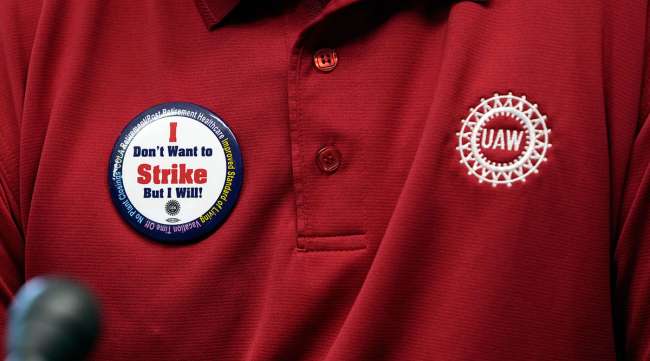Fain: Strike is ‘The Plan’ if Deals Not Reached Next Week

[Stay on top of transportation news: Get TTNews in your inbox.]
DETROIT — The head of the United Auto Workers warned Sept. 6 that the union plans to go on strike against any Detroit automaker that hasn’t reached a new agreement by the time contracts expire next week.
“That’s the plan,” President Shawn Fain responded when asked if the union would strike any of the companies that haven’t reached a tentative deal by the time their national contracts end.
A strike against all three major automakers — General Motors, Stellantis and Ford — could cause damage not only to the industry as a whole but also to the Midwest economy. A prolonged strike could lead eventually to higher vehicle prices.
In an interview with The Associated Press, Fain left open the possibility of avoiding a strike. He acknowledged, more explicitly than he has before, that the union will have to give up some of its demands to reach agreements. Contracts with the three companies will all expire at 11:59 p.m. EDT Sept. 14.
“There’s a lot of back and forth in bargaining,” he said, “and naturally, when you go into bargaining, you don’t always get everything you demand. Our workers have high expectations. We made a lot of sacrifices going back to the economic recession.”

Fain
In the interview, Fain did report some progress in the negotiations, saying the union will meet Sept. 7 with GM to hear the company’s response to the UAW’s economic demands. In addition, discussions are underway with Ford on wages and benefits. Stellantis, formerly Fiat Chrysler, has yet to make a counteroffer on wage and benefit demands, he said.
Stellantis declined to comment Sept. 6.
Last week, the union filed charges of unfair labor practices against Stellantis and GM, and it said Ford's economic offer fell far short of its demands.
Marick Masters, a business professor at Wayne State University in Detroit, said he thought Fain's latest remarks suggest “that he is opening up to the realities of bargaining” as the strike deadline nears.
“As you get close to the deadline," Masters said, "you begin to realize the importance of trying to resolve a problem rather than make a point. Strikes are painful, especially for workers, and also for companies.”
Fain's willingness to acknowledge publicly that he isn't going to achieve all the union's demands shows there is more flexibility in his approach than previously thought, Masters said.

Transport Topics' Seth Clevenger, Michael Freeze and Mike Senatore dissect the new Top 100 list of the largest private carriers, including how fleets are adapting to this softened market. Tune in above or by going to RoadSigns.ttnews.com.
Some signs of movement in the negotiations have emerged, raising the possibility, Masters said, that an agreement might be reached with one automaker that would set the pattern for the others.
“I think if they can avoid having to go out on strike and the pain that occurs and still get a very good bargain, I think they’ll be better off,” he said.
The union’s demands include 46% across-the-board pay raises, a 32-hour week with 40 hours of pay, restoration of traditional pensions for new hires, union representation of workers at new battery plants and a restoration of traditional pensions. Top-scale UAW assembly plant workers make about $32 an hour, plus annual profit sharing checks.
In his remarks to the AP, Fain argued that worker pay isn’t what has driven up vehicle prices. The average price of a new car has leaped to more than $48,000 on average, in part because of still-scarce supplies resulting from a global shortage of computer chips.
“In the last four years, the price of vehicles went up 30%,” he said. “Our wages went up 6%. There were billions of dollars in shareholder dividends. So our wages aren’t the problem.”
While saying a strike by up to 146,000 members against all three major automakers is a real possibility, Fain said the union doesn’t want to strike and would prefer to reach new contracts with them.
Want more news? Listen to today's daily briefing below or go here for more info:




